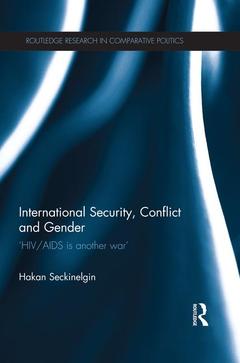Description
International Security, Conflict and Gender
'HIV/AIDS is Another War'
Routledge Research in Comparative Politics Series
Author: Seckinelgin Hakan
Language: English
Subject for International Security, Conflict and Gender:
Keywords
AIDS Politics; Healthcare Politics; HIV Epidemic studies; Hakan Seckinelgin; Young Man; DDR Process; IDP Camp; Gender Governance; HIV Risk; Bujumbura Rural; Demobilization Camps; Reinsertion Processes; International Policy Fora; International Security Discourse; International HIV; HIV Awareness; International Policy Context; International Policy Actor; IDP; Actual HIV Status; HIV Spread; HIV Infection; Burundian Conflict; Burundian Context; Causal Stories; HIV Prevalence; Aid Debate; DDR Program
Publication date: 09-2014
Support: Print on demand
Publication date: 06-2012
208 p. · 15.6x23.4 cm · Paperback
Description
/li>Contents
/li>Readership
/li>Biography
/li>
This book challenges the conventional security-based international policy frameworks that have developed for dealing with HIV/AIDS during and after conflicts, and examines first-hand evidence and experiences of conflict and HIV/AIDS.
Since the turn of the century international policy agenda on security have focused on HIV/AIDS only as a concern for national and international security, ignoring people?s particular experiences, vulnerabilities and needs in conflict and post-conflict contexts. Developing a gender-based framework for HIV/AIDS-conflict analysis, this book draws on research conducted in Burundi to understand the implications of post-conflict demobilization and reintegration policies on women and men and their vulnerability to HIV/AIDS. By centring the argument on personal reflections, this work provides a critical alternative method to engage with conflict and HIV/AIDS, and a much richer understanding of the relationship between the two.
International Security, Conflict and Gender will be of interest to students and scholars of healthcare politics, security and governance.
Introduction 1. Context, Conflict and Expereinces 2. Gender Relations 3. Gender Relations in the Conflict 4. Discontents of Re-integration 5. HIV/AIDS in People’s Lives 6. International Expert Knowledge and Its Production 7. People’s Voices 8. Communities of Policy and Communities of Everyday Life Conclusion



